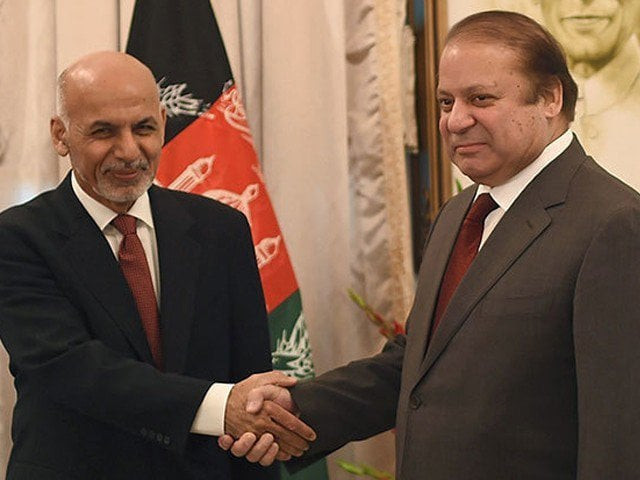A warning to be heeded
Relations with two neighbours that we enjoy the least cordial of relationships with have been in doldrums for a year

In this file photo, Afghan President Ashraf Ghani shakes hands with Prime Minister Nawaz Sharif. PHOTO: AFP
Thus it is that there is a report that the leaders of the Pakistan military have issued what amounts to a cautionary demarche to the generals now under the Trump administration. The message is as stark as it is realistic — there will be a ‘total mess’ in Afghanistan unless both the US and the UK (as well as other players with military irons in the fire) can halt the advance of the Islamic State and the Taliban. Whatever control Western governments had in Afghanistan is fast eroding since the drawdown of their troops. Their deployment had become increasingly unpalatable politically as well as ruinously expensive. The Taliban were never defeated militarily and with al Qaeda a reduced player the IS has moved into the vacuum in Afghanistan much as it has moved to populate available spaces in Pakistan.
The Taliban and the IS in Afghanistan now control large parts of the country; and with the Afghan army despite a strength on paper of 350,000 only able to deploy 20,000 that are combat-capable it is not difficult to see why Pakistan is pushing the alarm bells. The worry is that failure to halt the IS and the Taliban is going to prompt Russia into an intervention along the lines of that it made in Syria, the reasoning being that there is a need for Russia to protect its ‘back yard’ — and given the global nature of IS reach this is not an unreasonable position to take. Russia is no less vulnerable to the predations of the IS than any other state.
Any further collapse inside Afghanistan is extremely bad news for Pakistan. The Islamabad government has been critical of Afghanistan for failing to curb militants but as instanced above there is a severe capacity deficit when it comes to the Afghan military doing anything much beyond perform a symbolic function. The Taliban are able to present the current stalemate as a win for them — which it is. A strong Afghan Taliban will have long links both physical and ideological into the various iterations of the Taliban under the TTP flag inside Pakistan, and the presence of the Haqqani Network, still very much operational, a stone-throw away across the border is an undeniable threat.
The decanting of militants into Afghanistan by operation Zarb-e-Azb has compounded the problems faced by Pakistan. The recent closure of the border has hurt transnational trade as well as creating a mini-humanitarian crisis among those Afghans stranded in Pakistan — yet arguably essential. Efforts to beef up the border security are both railed against by Afghanistan and probably of little real value anyway. Pakistan stands exposed on its western flank to a ganglion of live and latent threats that intrude on internal security. For Afghanistan to be abandoned now — as it could be — leaves Pakistan in an invidious position. Western powers cannot be unaware of this. Now who’s turn is it to ‘do more’?
Published in The Express Tribune, March 7th, 2017.
Like Opinion & Editorial on Facebook, follow @ETOpEd on Twitter to receive all updates on all our daily pieces.















COMMENTS
Comments are moderated and generally will be posted if they are on-topic and not abusive.
For more information, please see our Comments FAQ